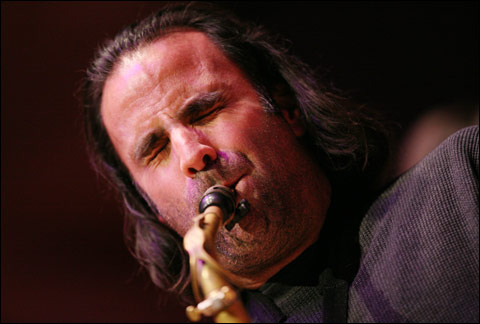
SOLID! Binney’s bravura playing and varied writing ground his music, and yet it’s constantly surprising. |
Scratch below the surface of any number of hard-playing jazz musicians these days and you hear a common refrain: "I hardly ever listen to jazz." The latest to tell me this is the phenomenal alto-saxophonist and composer David Binney, who listens mostly to rock, pop, and electronic music and less and less to jazz — "except for the older guys." What does he like? "The Irish rock band Snow Patrol and this Scottish band Frightened Rabbit," he tells me on the phone from New York. "This techno-y synth band Empire of the Sun. Yesterday I got the Sun Kil Moon record — it's great. Mark Kozelek is great anyway — I always liked the Red House Painters — but he just went up a notch. It's really deep."
This might be surprising news for those who know Binney only from his own CDs as a leader (16, by his count), or from his countless sideman gigs. Binney — who plays Scullers next Friday and then the Newport Jazz Festival on Sunday with pianist Craig Taborn, bassist Eivind Opsvik, and drummer Brian Blade — seems like a hardcore jazz guy. Having moved to New York from California at 19, he apprenticed himself to legendary teachers: Phil Woods, Dave Liebman, George Coleman. He's played with Aretha Franklin and Maceo Parker, hung with Steve Coleman's M-Base crowd in Brooklyn, and gigged with the Gil Evans Orchestra, Maria Schneider, Cecil McBee, Uri Caine, and Antonio Sanchez. And like a lot of exceptional players, he's not well known beyond his peers — who revere him. "He's well versed in many different musical languages," says Sanchez, "but his own free-spirited voice always comes across."
Binney's work is refreshingly varied. His own playing is marked by a broad, hard tone and fierce articulation that can easily play hide-and-seek when he partners with tenors like Chris Potter or Mark Turner. He and Potter have made for a bruising front line on a couple of his own albums, whereas Turner brings out his lyrical side on the 2006 release Cities and Desires (Criss Cross). Balance (Act, 2002) and Out of Airplanes (Mythology, 2006), with electric bass and guitar, are Binney at his most rocking and skronky. And the latter, where Bill Frisell is a major presence, even leans toward ambient electronics. All of these are marked by Binney's thrilling improvisations, his use of mixed meters, and his expansive, episodic exploration of form. This gives structure and deliberation to even his most crazed free two-horn blowouts. His most recent album, Aliso (Criss Cross, 2009), is surprisingly contained: covers of Monk, Coltrane, Sam Rivers, Wayne Shorter, mixed in with some of his most straightforward writing.
"It was done without any rehearsal," he explains. "Nobody was in town. I was going to cancel the gig. But then [drummer] Dan Weiss and [pianist] Jake Sacks said, 'Let's do it, it will be fine.' So we did it old-school, like the old Blue Note records. I wrote simpler tunes and matched them with older tunes I had never played. I called them in the studio and handed out the sheets."